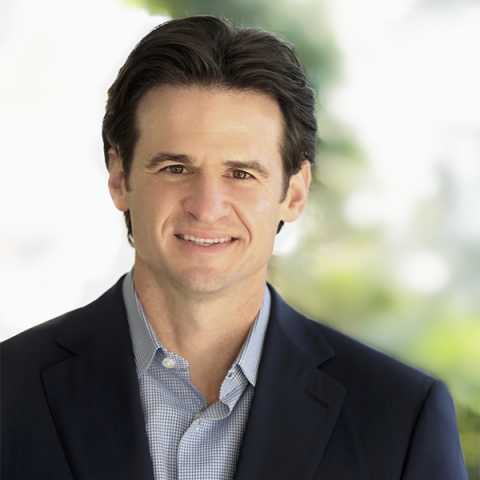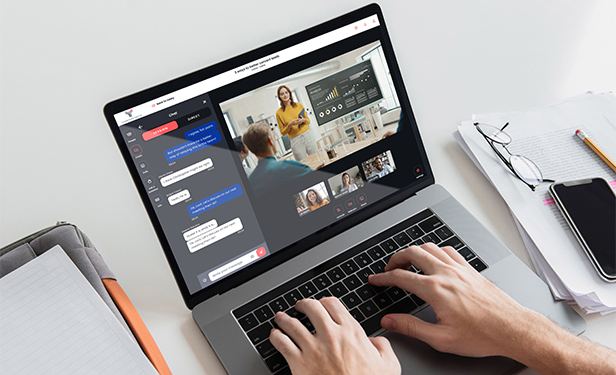Tech Giants: Aventri CEO Jim Sharpe Shares Four Keys to Hybrid Events

One of the driving factors that led Jim Sharpe to become CEO of leading events platform Aventri was that he saw a chance to work within an industry about to undergo a technological revolution. That was in January 2020. “I didn’t appreciate what that meant,” said Sharpe, who had a grand total of six weeks to become acclimated with events before COVID-19 turned the world on its head.
A newbie to the MICE industry, Sharpe was previously responsible for tech-enabled services at companies like Gerson Lehrman Group and Standard Purification. “More than anything, I leveraged my experience as a CEO of a manufacturing during the early days of COVID to figure out our strategy and pivot,” he recalled.
Walking while talking in a converted brewery that is Aventri’s headquarters, Sharpe is harvesting big ideas to meet the demands of COVID and post-COVID attendees and planners. The trick, he said, is that the solution has to seem simple even if it involves a complex system of computations that his team of engineers spends months, if not longer, creating. From exhibitors having better ways to communicate with attendees to planners melding distinct audiences into one large experience, Aventri aims to be the one-stop shop for events to reach new heights through means many imagined were at least a decade away.
That dream was put to the test earlier this year during the company’s global kickoff. For the first time, all of Aventri’s 250 employees, spanning seven countries, were able to connect at once. “We could bring together our entire company without the risk of flight delays, without the risk of time zone issues and without the risk of cost; it was fantastic for us to get our message across as an international company and focus on priorities,” he said.
Welcome to the advantage of virtual events, which also facilitates celebrity cameos like those Aventri incorporated. Always looking ahead, Sharpe predicted a hybrid approach for the same next year in which leadership will meet in-person but the whole organization will dial in remotely. In that regard, Aventri will follow the industry’s lead. But in many other ways, it is Aventri helping to dictate the way in which the industry is headed.
Recognizing a problem that manifested early in the pandemic, Aventri last December debuted a digital lead capture program to enhance exhibitors’ ROI at Expo! Expo! last year. Trying to find ways to communicate on a variety of channels is the future, Sharpe said.
Here is a sample of what else Sharpe believes is ahead for event professionals.
Digital and In-Person Will Merge. Sharpe described his vision of hybrid as a “dream state.” “We envision a world where people can attend a live event and be sitting in the audience, while also watching a virtual event on their mobile device. They’ll be able to network seamlessly with attendees who are in the same room or across the world in real time.”
Eyes on Exhibitors. Much of the planning ahead for the industry has been to lay the groundwork for adapting on the fly. Take the digital lead capture program programmed to enhance the exhibitor-attendee interaction. It allows for one-on-one video conferencing while allowing relevant content to be populated simultaneously on the platform. Exhibitors will be allowed to evaluate a lead’s potential faster, allowing more time to be spent engaging in meaningful conversation.
This all leads to the missing link from virtual events: The right data to move forward. “I think the last frontier for ROI is the reporting exhibitors get,” Sharpe said. “They’ve been frustrated with the inability to get the data of who they’ve been meeting with and how productive it was. That’s something companies like Aventi are working on.”
Concentrated Efforts. While attendees will be spread across the globe, event organizers need to be able to keep all their information in one place, Sharpe said. Planners will be looking toward universal solutions to track attendees’ movements through a trade show or convention to help better predict where they might be interested in visiting next.
“There’s going to be more tech-enabled experiences to drive personalization, meaning you’re going to start seeing recommendation engines and other AI to tell people how to enjoy the event on-site better,” Sharpe predicted.
 Keep It Simple. With the world going hybrid and all the changes that come with that, Sharpe said it’s incumbent on technologies like Aventri to be as easy to use as possible. “It has to be easy to launch and manage; it needs to be easy to attend and to pivot between the two formats. And then it needs to be very interactive. It’s very important that it’s all seamless,” he said.
Keep It Simple. With the world going hybrid and all the changes that come with that, Sharpe said it’s incumbent on technologies like Aventri to be as easy to use as possible. “It has to be easy to launch and manage; it needs to be easy to attend and to pivot between the two formats. And then it needs to be very interactive. It’s very important that it’s all seamless,” he said.
To that event, Aventri launched its Virtual Events 2.0 in April to further streamline the end-to-end management process. “It’s clear hybrid is the future of event marketing,” Sharpe said. “Our research shows that 89% of global organizers say virtual will remain a vital part of their long-term strategies, even after live events resume.”
Don’t miss any event-related news: Sign up for our weekly e-newsletter HERE and engage with us on Twitter, Facebook, LinkedIn and Instagram!


Add new comment